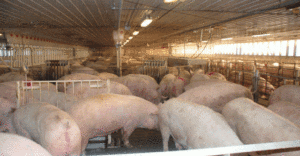 In 2018, California voters passed Proposition 12 (Prop 12) which is a ballot initiative to provide more space for farmed animals, in particular laying hens, breeding sows and veal calves in California. Prop 12 is also known as the Farm Animal Confinement Initiative and offers protections to egg-laying hens, mother pigs, and calves raised for veal. Prop 12’s provisions went into effect January 1, 2022 and provisions for pork were on hold and finalized on September 1, 2022, to come into effect July 1, 2023. Prop 12 gives much more specific provisions, including minimum square footage requirements but also a sales ban against noncompliant animal products from out of state. Prop 12 should affect nearly one million pigs and 40 million egg-laying hens each year.
In 2018, California voters passed Proposition 12 (Prop 12) which is a ballot initiative to provide more space for farmed animals, in particular laying hens, breeding sows and veal calves in California. Prop 12 is also known as the Farm Animal Confinement Initiative and offers protections to egg-laying hens, mother pigs, and calves raised for veal. Prop 12’s provisions went into effect January 1, 2022 and provisions for pork were on hold and finalized on September 1, 2022, to come into effect July 1, 2023. Prop 12 gives much more specific provisions, including minimum square footage requirements but also a sales ban against noncompliant animal products from out of state. Prop 12 should affect nearly one million pigs and 40 million egg-laying hens each year.
Since it was passed in 2018, Prop 12 has been opposed by some in the industry including the US pork industry. California has very little pork production, but the largest pork market of any state (13-15% of the total US market). Prop 12 mostly applies to pork producers outside of California’s borders, however they will still need to retrofit barns in order to sell their product in California. However, 9 other states have already passed laws requiring pork producers to phase out gestation crates. Two of the largest US pork companies, Tyson Foods and Hormel have agreed to comply with Prop 12. Many countries have banned gestation crates including the United Kingdom, Canada, Switzerland and Sweden.
The National Pork Producers Council (NPPC) strongly oppose Prop 12 as they believe it to be unconstitutional as the ban on sale of out-of-state pork is a restraint of interstate commerce as California is seeking to impose its regulations on farms located outside of the state. The NPPC also state it imposes arbitrary standards that lack scientific, technical or agricultural basis. The NPPC also claim it will increase food prices and disrupt supply chains. The cost of changes to comply with Prop 12 is estimated to cost $3500/sow which will likely pass on to consumers. The Prop 12 law also threatens producers’ livelihoods as the increase in financial investments and increase in standards pose challenges for how producers operate. Those in the Pork industry argue that Prop 12 lacked consultation with experts in the industry such as producers or veterinarians, but was driven by a “Get out the Vote” text campaign by volunteers for The Humane League in San Francisco, Los Angeles and San Diego. They sent 1.375 million text messages to voters throughout the state, and collected more than 660,000 signatures.
Prop 12 and chickens:
Prop 12 allows egg laying hens, which includes chickens, turkeys, ducks, geese and guinea fowl, litter bedding and space. Flooring is required to be bedded with litter such as sawdust, straw, shavings, rather than just bare mesh. Tiered housing must allow perch and roosting space above the ground and birds must have a minimum of one square foot of floor space each. In houses with only one level, birds are required to have one and a half square feet of floor space. Those who fail to implement the cage specifications would be charged with misdemeanors, with fines up to $1000 by the California Department of Food and Agriculture. California’s older animal welfare law only covered shell eggs, but Prop 12 also covers liquid eggs (used for restaurants, cafeterias and food manufacturers).
Prop 12 and pigs:
In the US sows are often confined in gestation crates. Prop 12 dictates sows must have 24 square feet of floor space each, which is more than the industry’s typical crate-free space allotment of 16 to 18 square feet. It also prohibits breeding pens. Prop 12 applies to any uncooked pork solid.
Prop 12 and cows:
Calves raised for veal must have at least 43 square feet of floor space.
Improving the quality of life animals in industrial farms will mean that barns will need to be retrofitted to change the way animals are raised. The cost of which will invariably be passed down to consumers. There may be an increase in price of bacon and other pork products in California, and there may be shortages until the industry stabilizes. While the pork industry has been fighting the new law, those in the poultry industry have largely complied. Egg producers have largely complied with the Californian law changes and United Egg Producers, an industry traded association, have said “UEP’s farmer-members support all types of hen housing and will comply with California’s new law, when implemented.”
The NPPC are still fighting Prop 12 in National Pork Producers v Ross and the Supreme Court heard oral arguments in October. The latest action by California is the extension of a state court injunction to prevent implementation of Prop 12 until July 1, 2023 likely after the Supreme Court rules early 2023. The ruling of NPPC v Ross will ultimately decide if Prop 12 can be enacted as the American Farm Bureau and NPPC are still challenging the constitutionality of Prop 12.
Sources:
https://www.cdfa.ca.gov/AHFSS/AnimalCare/
https://www.pigprogress.net/the-industrymarkets/market-trends-analysis-the-industrymarkets-2/prop-12-us-supreme-court-ruling-expected-by-february-2023/
https://thehumaneleague.org/article/prop-12
https://roseinstitute.org/proposition-12-farm-animal-confinement/
https://www.supremecourt.gov/oral_arguments/audio/2022/21-468
